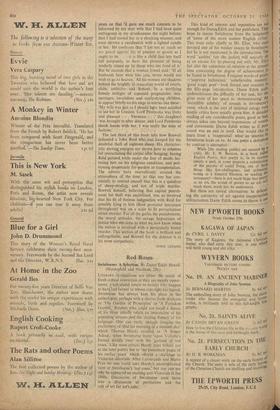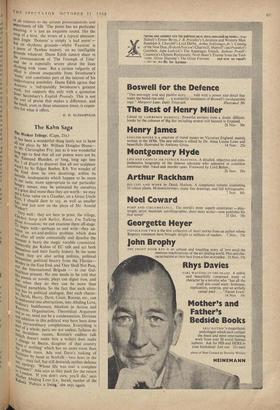Red Roses •
Swinburne: A Selection. By Dame Edith Sitwell. (Weidenfeld and Nicolson, 25s.)
LITERARY revaluations arc either the result of fresh critical conviction or they are merely oppor- tunist, a calculated return to writers who happen to have, lost favour or whose copyright has lapsed. Swinburne has always kept his place in The anthologies, perhaps with a chorus from Atalanta or 'The Garden of Proserpine' or 'A Forsaken Garden.' Readers who could not recall a stanza of his verse usually retain an impression, of his pounding stresses and the cloying fluency of his language. One can easily enough imagine the excitement of 'that far morning of a summer day' which Thomas Hardy recalled in 'A Singer Asleep,' when Swinburne burst 'upon Victoria's formal Middle time' with his 'garland of -red roses.' Like most critics, Hardy pays tribute not to the later poetry but to 'the passionate pages of his earlier years' which offered a- challenge to Victorian decorum. After Lafourcade and Mario Praz no one could take Hardy's uncomplicated view of Swinburne's 'red roses,' but one can see why he appeared an exciting anti-Victorian in the 1860s. Discussion of Swinburne soon turns into a discussion of puritanism and the cult of art for art's sake. This kind of interest and reputation are not enough for Dame. Edith and her publishers. TheY hope to rescue Swinburne from the judgments, of some of the more austere English critics. This must refer chiefly to Mr. Eliot, who once devoted one of his weaker essays to Swinburne, but he is not mentioned in the introduction. rho word 'austere' (on the jacket) will scarcely do as an excuse for by-passing not only Mr. Eliot but also the consensus of opinion at the present time concerning the degree of achievement to be' found in Swinburne. Frequent words of praise, --1-`supreme technician,' 'unbelievable masterY, 'great tragic poet'—look forced and oracular in the fifty-page introduction. Dame Edith quite underestimates the difficulty of her task, for she gives most of her space to .'demonstrating' the 'incredible subtlety' of sounds in Swinburne, verse, which is the sort of minimal eulogy evell, hostile critics have usually given him. A detailed reading of any considerable poem, good or had,' always takes one beyond impressions of vowels and consonants. Dame Edith writes as if pure sound was an end in itself. One would like to learn from a 'reappraisal' what an interest-in Swinburne leads on to_ At one point a definition by contrast is attempted: While [the reading public] are assured by 41, critic, Mr. F. W. Bateson, in a book called English Poetry, that poetry is, 'in its essence' simply a part, in some respects a culmination. of the process of social living, one of those things like law-abidingness, and politeness, voting at a General Election, or reading the newspaper—there is not much hope that
as an art, the sound of poetry as an art,
v411
reach them, much less be understood. But these are unreal alternatives. In defend' ing the autonomy of art against inappropriate utilitarianism Dame Edith seems to throw it out
01 all relation to the serious preoccupations and enlaYments of life. 'The poem has no particular meaning. it is just an exquisite .sound, like the song of a bird, she writes of a typical pleasure- Pain jingle. 'Dolores' is simply 'a bad poem'— but on rhythmic grounds—whilst 'Faustine' is a Poem of 'flawless majesty on no intelligible grounds whatever. Dame Edith cannot share in the commendation of 'The Triumph of Time' and she is especially severe about the lines rhyming with 'roses: But a certain vulgarity of effect is almost inseparable from Swinburne's music and constitutes part of the interest of his llndeveloping sensibility Dame Edith agrees that Atalanta is 'indisputably Swinburne's greatest work,' but supports this only with a quotation from Saintsbury's English Prosody. This is not !," sort of praise that makes a difference. and 111.e book, even in these unaustere times, is expen- sive for what it offers.
, G. D. KLINGOPULOS



















































 Previous page
Previous page